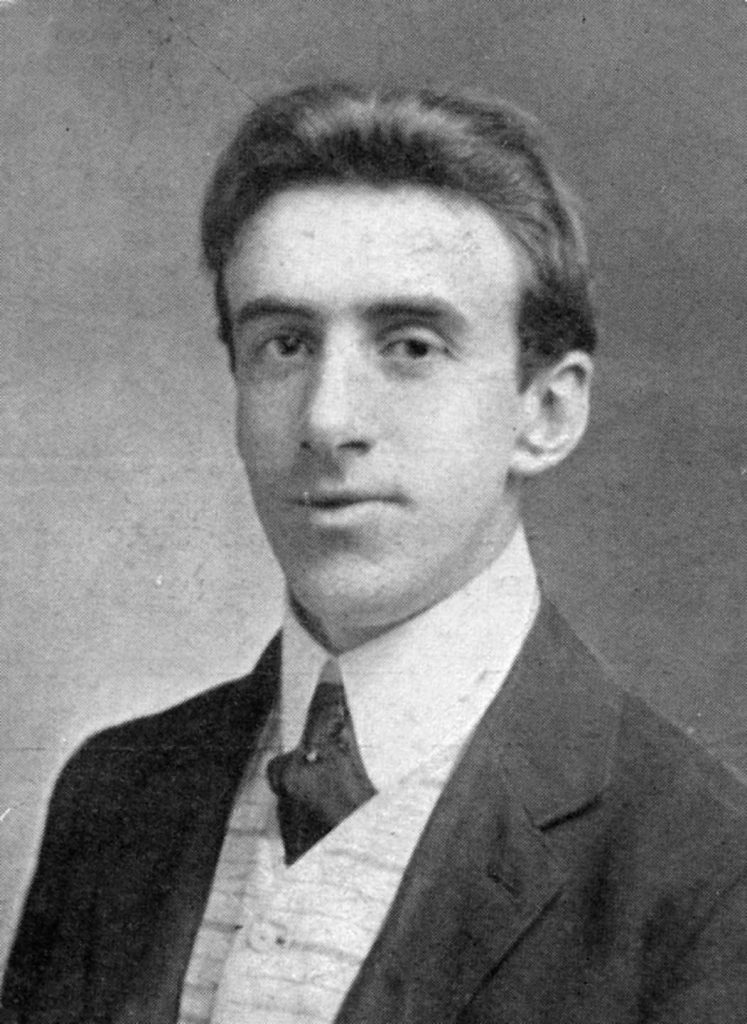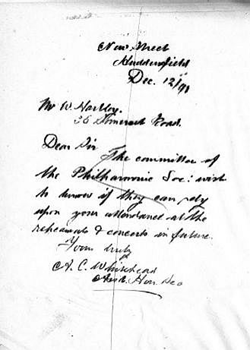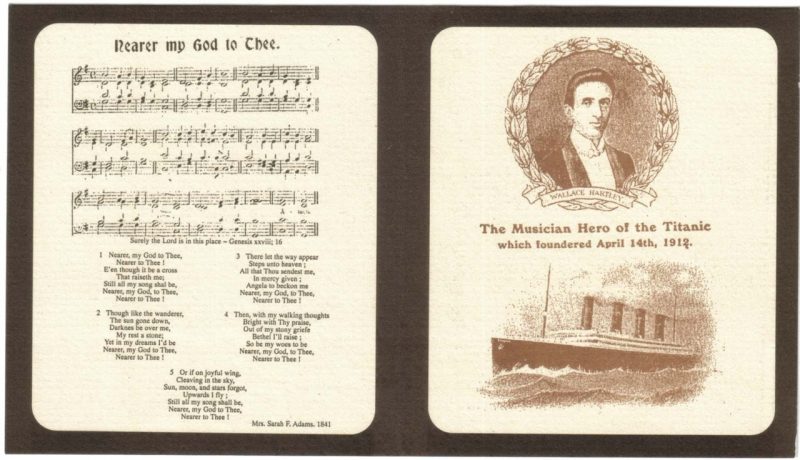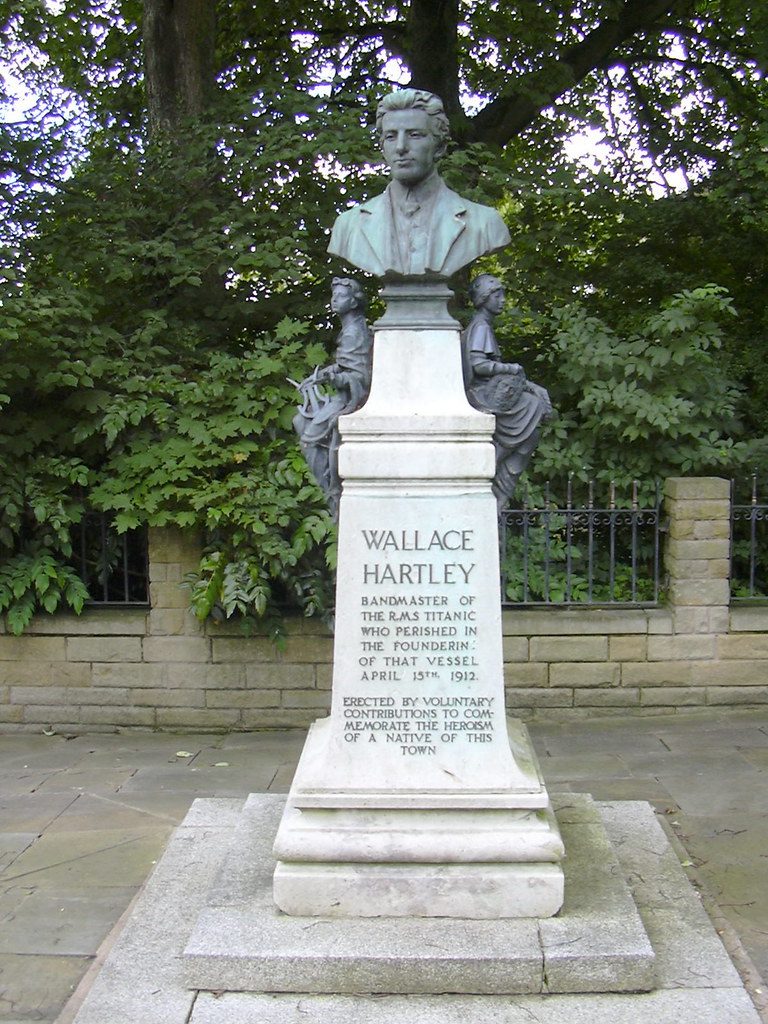Wallace Henry Hartley was born on 2nd June 1878, in Colne, East Lancashire. His parents Albion and Elizabeth Hartley were both employed in the local textile trade, which at the time produced cotton for export around the world. Wallace was the younger brother to Mary Ellen, who had been born the previous year. When Wallace was 7 years old, his mother gave birth to another boy, Ughtred Harold, but he tragically died not long after his 1st birthday, although around this time Wallace’s mother gave birth yet again, this time to another girl, Elizabeth, or Lizzie.
Wallace Hartley’s father Albion was employed in a mill, and in 1885, a catastrophic fire in the mill led to many people being laid-off, and Albion was one of them. Subsequently, he became an agent for the Refuge Assurance Company, who had a branch in Colne. Five years later, Albion Hartley received a promotion, and became assistant superintendent at Refuge Assurance. Because of this move, the family underwent a move of their own, and moved to a more affluent part of the town.

Wallace Hartley’s love for music, which would eventually become his career, and then ultimately lead to his death, began at Colne’s George Street School, but his family were of a musical nature too. His father was choirmaster at Bethel Chapel in Colne, and young Wallace became a choirboy there too, and his father encouraged him to take additional music lessons after school, perhaps realising his developing talent.
Wallace Hartley took a position as a clerk at the Craven and Union Bank upon leaving school, which is still there in Colne to this day, although it is now a branch of Barclay’s Bank.
Wallace Hartley’s father Albion had received a further promotion in 1893, becoming superintendent, and two years later, in 1895, came yet another move for the family, although this time, it would be to a new county – the West Riding of Yorkshire. The Hartley family duly moved to Huddersfield, where Albion continued his developing career with Refuge Assurance.
Wallace Hartley wasted no time in joining the Huddersfield Philharmonic Orchestra, and he also found another job, again as a clerk.
This letter pictured down is dated December 1898, was sent to Wallace Hartley from the assistant secretary of the Huddersfield Philharmonic Society. It reads;
‘Dear Sir,
The committee of the Philharmonic Soc. wish to know if they can rely upon your attendance at the rehearsals and concerts in future.’
Obviously Wallace Hartley’s attendances at the H.P.O. must have been slipping a little, and the letter was perhaps a gentle reminder. It must have had some effect, as Wallace did play with the Huddersfield Philharmonic Orchestra again the following year.
The first couple of years the Hartley family spent in Huddersfield were relatively uneventful, but as Wallace Hartley entered his twenties, he found himself wanting to make a career from his music, and give up the unspectacular work involved in being a clerk. Perhaps he daydreamed about a life on the ocean wave, we will never know, but what we doknow is that in May 1903, his dream of turning his hobby into his career became a reality, and he moved to the seaside resort of Bridlington, on England’s East Coast. Wallace Hartley’s professional career began with him playing First Violin in the Bridlington Municipal Orchestra.
In 1909, Wallace Hartley finally began his career at sea, but he wasn’t working for the White Star Line just yet. His first posting was aboard the rival Cunard Line’s Lucania. Lucania was close to the end of her career when Wallace Hartley joined the crew, and on 3rd July, 1909, after sailing from New York, she docked in England, and was promptly laid-up by Cunard. Of course, at this time, the majority of Cunard’s transatlantic passenger-carrying was performed by the four-funneled twins Mauretania and Lusitania, which had both entered service in 1907, and it was therefore the Lusitaniathat Wallace Hartley joined next in his tragically-short ocean-going career, playing second violin in the ship’s five-man band.
In the October of 1910, Wallace Hartley was offered a promotion he could hardly resist – he was to become the bandmaster on Mauretania, a position which he duly accepted on October 29th. Mauretania was probably the most famous ship on the transatlantic run at that time, and prior to the introduction of the White Star Line’s Olympic in 1911, she was certainly the most luxuriously appointed ship afloat, and carried the very cream of society across the North Atlantic.
Not only Mauretania the finest vessel afloat at that time, but she was also the fastest too. After stealing the coveted Blue Riband from her sister Lusitania, she held on to it for an incredible twenty years.
In December 1911, Mauretania was moored on the Mersey during a turnaround, and during a strong gale she broke her moorings and ran aground, with the result that she was laid-up for repairs to her damaged hull for the next two months, which left Wallace Hartley unemployed for the period.
At the beginning of 1912, C.W. & F.N. Black, a company of Liverpool music agents, proposed a system to the major shipping lines to supply musicians at a much cheaper rate than they currently earned, saving the lines a small fortune. Despite protestations from the musicians and the musicians’ union, the plans were agreed, and both the Cunard and White Star Lines used more-or-less the same musicians they had previously employed, but now they were booked through an agency. This agency held a complete hold on any of it’s musicians, and could even fire a member at the end of a voyage for no reason should it feel that way inclined.
Wallace Hartley rejoined the repaired Mauretania for her 23rd March sailing to New York, but now he was officially working for C.W. & F.N. Black. When Mauretania returned to Liverpool on Monday 8th April, Wallace Hartley reported to the musician’s agency and was told by Blacks that he was once again going to be the bandmaster on the largest and most luxuriously-fitted vessel in the world – this time the ship’s name was Titanic, and she sailed in two day’s time from Southampton.

Wallace Hartley’s first official duty was to ensure that there was music for the First Class passengers boarding Titanic on departure day, and he and his colleagues performed on the upper decks overlooking the dock when the boat train arrived from London.
Although usually referred to as ‘The Band‘ or ‘The Orchestra’, in truth there were actually two separate units that performed music at different times, and in different places. Wallace Hartley’s quintet played at evening dinner, after dinner concerts, Sunday service etc. Then there was a trio of violin, cello and piano that played in the reception room outside the A la Carte Restaurant and the Cafe Parisien. These separate units usually worked independently of each other, and it’s almost certain that when Hartley assembled the band on the night of the sinking, it was the first time the eight of them would have all played together, and tragically it would be the last time too.
Shortly after midnight, as Titanic’s lifeboats had begun to be loaded, Wallace Hartley assembled his band in the First Class Lounge, where many of the First Class passengers were now assembling, and began to play. Many people later commented on how strange it seemed to be wearing a life jacket, awaiting orders to get into the lifeboats, whilst the band continued to play away as though nothing had happened. Later, as more and more people began to realise the seriousness of the situation, and began to file onto the Boat Deck, so too did Hartley, reassembling his men on the Boat Deck close to the entrance of the Grand Staircase.
Many people are of the opinion that the actions of Wallace Hartley and the other members of Titanic’s band in the time between the collision and the final foundering kept passengers calm, and enabled the lifeboats to be loaded in an orderly fashion, which may be correct. There is of course another school of thought; that people on board the doomed liner didn’t realise the seriousness of the situation soon enough because of the music the band played.

In the year 2000, as part of the Millennium celebrations throughout the UK, Wallace Hartley’s home town of Colne designed a mural as a tribute to the town’s people, its industry and of course its history. This mural, on Parliament Street, features the town’s biggest hero, Wallace Hartley.

